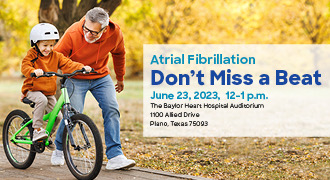
Course Description
Come hear a comprehensive medical discussion about atrial fibrillation. Learn your treatment options and how you can get your rhythm back. Food and refreshments provided. In-person seating limited. Please RSVP by using the QR code. For virtual screening, RSVP and choose “Virtual”
A racing, pounding heartbeat that happens for no apparent reason should not be ignored, especially when other symptoms are also present, like shortness of breath with light physical activity or lightheadedness, dizziness, or unusual fatigue. AFib is an irregular heartbeat or a condition in which the heart muscles fail to contract in a strong, rhythmic way. When a heart is in AFib, it may not be pumping enough oxygen-rich blood out to the body.
Why is AFib associated with a five-times-greater risk for stroke? When the heart is in AFib, the blood can become static and can be left pooling inside the heart. When blood pools, a clot can form. When a clot is pumped out of the heart, it can get lodged in the arteries which may cause a stroke. Blocked arteries prevent the tissue on the other side from getting oxygen-rich blood, and without oxygen the tissue dies.
Any person who has AFib needs to evaluate stroke risks and determine with a healthcare provider what must be done to lower the risks. Studies show that many people with AFib who need risk-lowering treatments are not getting them. – American Heart Association